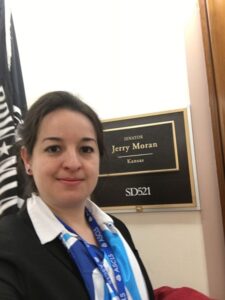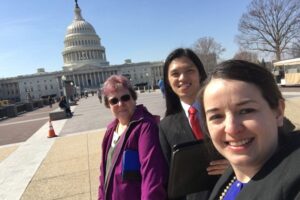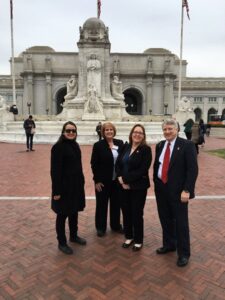Volume 35 Number 5 | October 2021
Letycia Nuñez-Argote, MPH, MLS(ASCP)CM

Amid all the uncertainty that month, the 2020 Laboratory Legislative Symposium could not take place. This event is a gathering of laboratory professionals and partners that provides an opportunity to advocate for our profession as a unified voice. We have come together annually for more than 30 years, but last year we could not go to Congress to meet with our representatives. From that point on, it became clear that things would be different and that the way we organize our advocacy efforts would also have to change.
Advocacy is Powerful
Many people do not feel the urge to participate in advocacy efforts, often out of timidness toward approaching elected officials, aversion to the conflict in politics, or mistrust toward the governing institutions. But advocacy is powerful. It is the process of supporting a cause and a tool that we can use to communicate the laboratory’s needs to our representatives.1 It also helps increase visibility and remind others that medical laboratories are essential to every person’s health; patients may not see us, but we matter.
“The skills and tools of advocacy are valuable in the hands of laboratory scientists, and we can apply them in many ways to support decisions and create change.”
Engaging in advocacy helps highlight the impact of government decisions on our professional practice, the healthcare workforce, and our patients’ care. It is an act of selflessness that transcends political affiliations and ideologies.
Also, people working in government are duty-bound to listen. And, when asking for their support toward initiatives that can make things better for the laboratory, our time is not wasted. In the words of Benjamin Franklin, “He that has once done you a kindness will be more ready to do you another, than he whom you yourself have obliged.”2
Asking for your representatives to sponsor a bill that will increase funding for laboratory training programs and address healthcare workforce shortages, or for their support of legislation to revise guidelines for clinical laboratory testing, can have a significant impact and a positive downstream effect. Building a relationship with legislators today can go a long way in helping support future initiatives. When we do not engage in these efforts, we allow one of two things to happen—either nothing gets done, in which case our problems are not addressed, or things get much worse, which occurs when bad policies or poorly implemented laws hurt medical laboratories across the nation.
They Need Us
We have it in us to become advocates. The skills and tools of advocacy are valuable in the hands of laboratory scientists, and we can apply them in many ways to support decisions and create change. When you choose to become an advocate, it changes the way you see yourself and others. It allows you the opportunity to lend your expertise and know-how to your appointed or elected officials. And believe me, they need us.
From pointing out the impact of reagent and equipment shortages to making them aware of existing legislation they should support, there are many things that each of us can do right now to participate in advocacy. We can organize grassroots efforts among our co-workers to contact our representatives about specific issues. We can volunteer as our ASCLS state chapter Government Affairs Committee contact person and be the ones that communicate activities and decisions at the state and national level that may impact medical laboratories. We can show our support for policy initiatives shared by ASCLS, the American Society for Clinical Pathology (ASCP), Association of Genetic Technologists (AGT), American Medical Technologists (AMT), and other laboratory organizations.
This brings me back to the Laboratory Legislative Symposium. This event has, throughout the years, been an important place where the essential efforts of training and mentorship for advocacy take place. Last year, the pause to in-person conferences enabled the organizers of this event to propose changes that will hopefully increase attendance and visibility during our visit to Capitol Hill.
What’s New?
Until recently, the Laboratory Legislative Symposium took place in March. Now, the event will happen in the fall, allowing us to visit with Congress closer to the end of the term when many decisions about bills are taking place. This event will happen in the fall from here on out; for 2021, the dates are Monday, October 25, and Tuesday, October 26.
In addition, those who cannot take time off to attend the meeting in person can now also attend virtually. If you have always been curious and wanted to learn more about legislation and advocacy, but traveling to Washington, D.C., was just not a possibility, this is your chance.
The laboratory community is resilient and persistent. With emerging diseases, such as COVID-19, becoming more prevalent and affecting our places of work and our communities, it is more important than ever for us to invest our time and energy in advocacy. We have to be the agents of change and look out for each other. I hope you can join us October 25-26, in-person or virtually, and by organizing locally with your colleagues and friends to advocate for the laboratory profession. Let’s continue the tradition of advocacy for many years to come.
Visit Laboratory Legislative Symposium to learn more. #Labvocate #IamASCLS
References
- “Advocacy.” Merriam-Webster.com Dictionary, Merriam-Webster, https://www.merriam-webster.com/dictionary/advocacy. Accessed 1 Aug. 2021.
- Franklin, B. Autobiography of Benjamin Franklin. Project Gutenberg, December 28, 2006. https://www.gutenberg.org/files/20203/20203-h/20203-h.htm#IX
Letycia Nuñez-Argote is Assistant Professor in the Department of Clinical Laboratory Sciences School of Health Professions at the University of Kansas Medical Center in Kansas City, Kansas.
Author Letycia Nuñez-Argote visits her senator during the 2018 Laboratory Legislative Symposium.
Author Letycia Nuñez-Argote on Capitol Hill with members of ASCLS-Kansas during the 2019 Laboratory Legislative Symposium.
Author Letycia Nuñez-Argote participates in the 2017 Laboratory Legislative Symposium with members of ASCLS-Arkansas.


